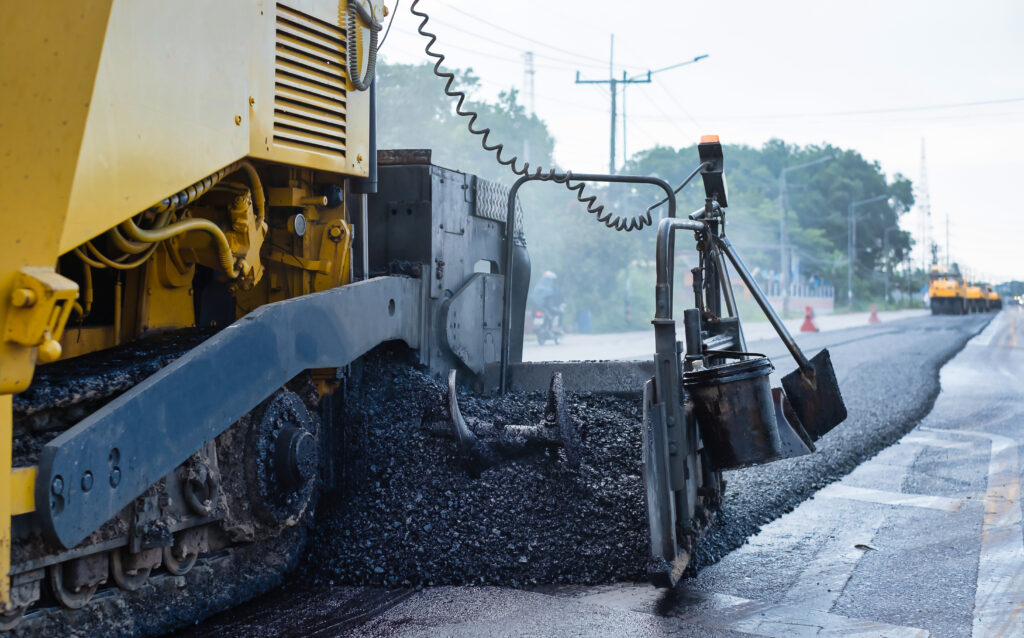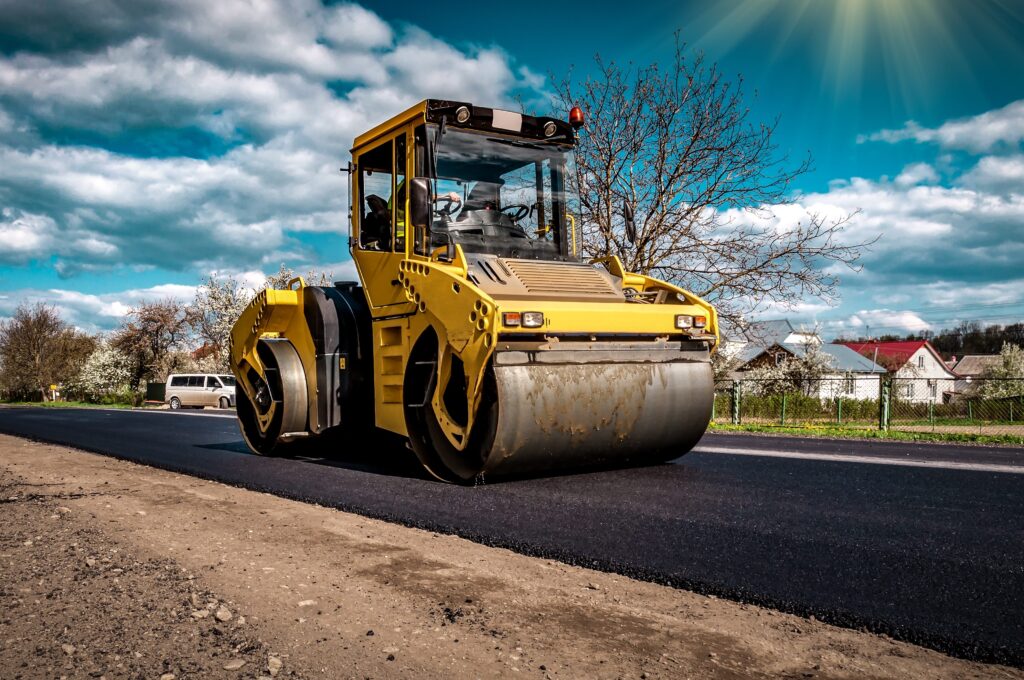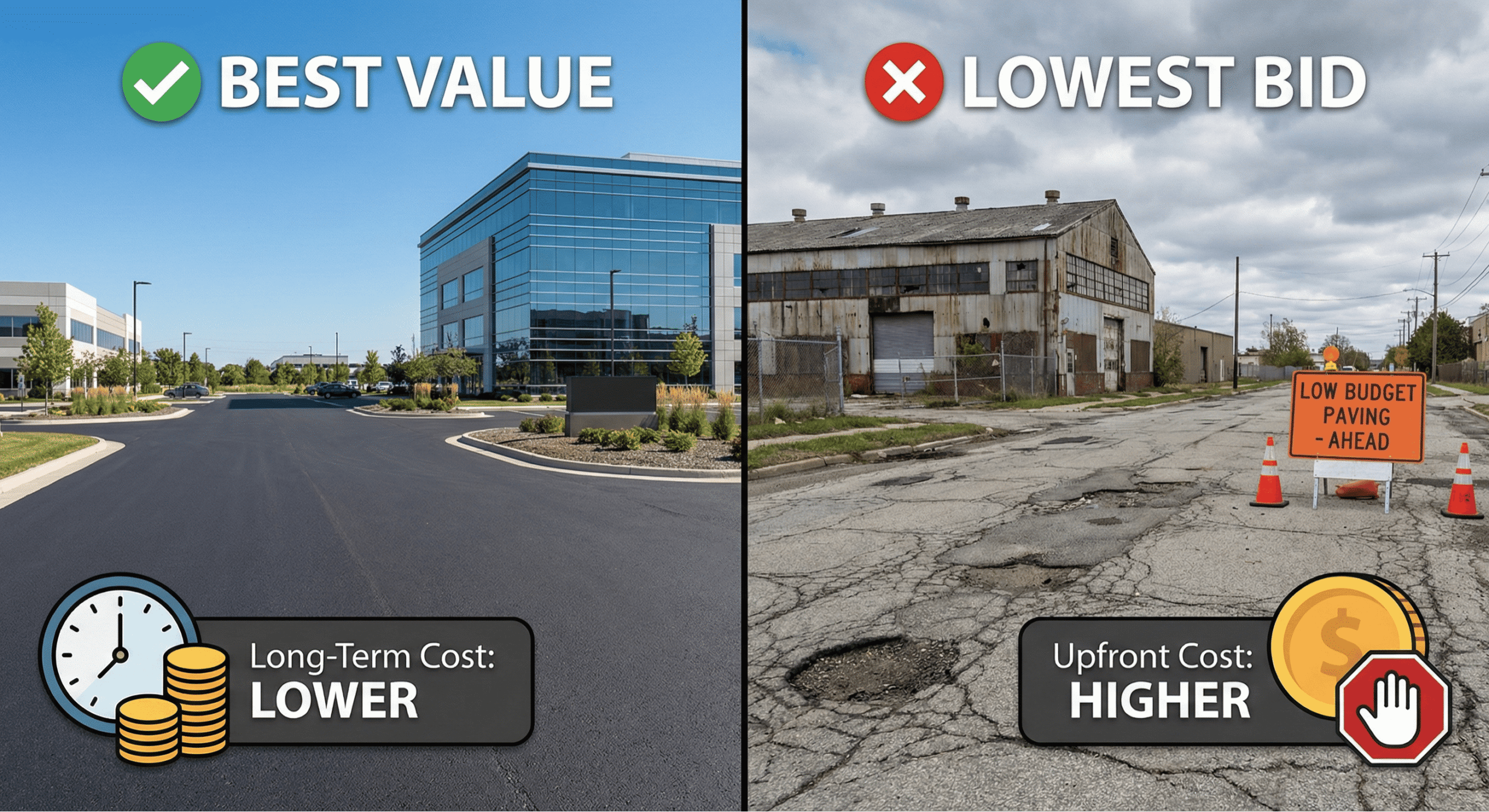
Denver is experiencing rapid growth. New housing communities, expanding business districts, and large-scale development projects are changing the face of the city, so much so that the urbanized area of Denver expanded from about 150 square miles in 1950 to nearly 499 square miles by 2000 (U.S. Geological Survey). With this growth comes a pressing challenge: building and maintaining the roads, parking lots, and paved surfaces that keep Denver moving.
The challenge is clear. More people and more vehicles mean heavier traffic and greater wear on existing infrastructure. In fact, the Denver region’s roads see roughly 13 million vehicle trips per day, covering over 83 million miles on the local street and highway system. Add in Denver’s harsh freeze-thaw cycles, and poorly built pavements quickly show cracks, potholes, and costly damage. These issues do not just create inconvenience. They slow down development, drive up maintenance costs, and affect the safety and appearance of neighborhoods and commercial areas.
The solution lies in investing in quality asphalt paving services in Denver. Asphalt is a practical choice because it is durable, flexible, and cost-effective. When installed and maintained by skilled contractors, it can withstand heavy loads, endure seasonal weather changes, and provide long-lasting performance. This makes it a key player in supporting Denver’s urban growth and shaping a reliable foundation for the city’s future.
This blog highlights how urban expansion in Denver drives the need for reliable asphalt paving and what property owners and developers should know before starting a project.
Denver’s Rapid Urban Growth and Its Impact on Infrastructure
Denver’s skyline and neighborhoods are expanding quickly, and with this growth comes the need for stronger, more reliable infrastructure. Roads, parking lots, and public spaces are all feeling the pressure of increased demand. Quality paving has become more than just a necessity. It is the foundation that keeps the city connected, safe, and moving forward.
How Population Growth Shapes Road and Paving Needs
With thousands of new residents moving into Denver each year, the demand for well-built roads is climbing. In fact, the Denver metro area grew by about 2.8 percent between 2020 and 2024, adding some 82,000 residents.
More people mean more cars on the road, which leads to greater wear and tear on the pavement. Without proper planning and quality asphalt paving, traffic congestion and road damage can worsen, slowing down both commuters and businesses.
Commercial and Residential Expansion Across the City
As new housing developments and commercial centers rise, parking lots, driveways, and access roads must keep pace. Every new residential community requires reliable surfaces for residents, while retail and office spaces depend on smooth, durable lots to welcome customers. Asphalt paving plays a central role in creating safe and functional spaces for both.
Why Transportation Networks Are at the Heart of Urban Development
A growing city relies heavily on its transportation systems. Roads, highways, and connectors are essential for moving people, goods, and services. When these networks are built with high-quality asphalt, they remain durable and dependable, supporting Denver’s ongoing development. Strong paving helps create a city where sustainable growth and mobility are seamless.
Moreover, proper pavement design isn’t just about durability, it also affects safety. According to the Federal Highway Administration, improving pavement friction can help prevent or minimize up to 70 percent of wet-pavement crashes.
The Role of Asphalt Paving in Supporting Denver’s Growth
As Denver keeps growing, asphalt paving plays a bigger role than ever. From busy highways to neighborhood streets and parking lots, asphalt is what keeps the city running smoothly. It’s durable, affordable, and flexible, making it the go-to choice for urban projects.
In fact, 94 percent of all paved roads in the U.S. use asphalt, showing just how trusted and widely used it is. That’s why Denver’s fast-paced growth relies on strong, reliable asphalt paving to keep traffic moving and new developments on track.
Asphalt as a Cost-Effective Choice for Expanding Cities
City planners and property owners alike recognize the value of asphalt as a budget-friendly paving option. Compared to other materials, it offers a lower initial cost and reduced maintenance expenses over time. This makes it a practical solution for a fast-growing city like Denver, where new projects are constantly underway.
Flexibility and Speed of Asphalt Installation
In a city where development moves quickly, time matters. Asphalt paving can be installed and opened to traffic much faster than alternatives, helping projects stay on schedule. Its flexibility also allows it to adjust to Denver’s shifting soil and weather conditions, reducing the risk of major damage and costly repairs.
Comparing Asphalt to Concrete for Urban Projects
Both asphalt and concrete are used in city infrastructure, but asphalt often wins out in urban applications. Asphalt provides smoother rides, is easier to repair, and performs better during Denver’s freeze-thaw cycles. Concrete may last longer in some conditions, but it requires higher upfront costs and more time for installation. For most urban projects, asphalt provides the right balance of strength, speed, and cost savings.
Meeting the Demands of Heavy Traffic and Daily Commutes
Traffic in Denver has grown steadily alongside the city’s population, putting more strain on highways, arterial roads, and local streets. In fact, the Denver Regional Council of Governments (DRCOG) reports that total vehicle miles traveled in the region returned to pre-pandemic levels in 2023, and they project a 42% increase by 2050.
With one-third of lane miles expected to experience congestion for three or more hours daily, the pavement must be strong enough to handle both the daily rush and the weight of delivery trucks and public transportation. Quality asphalt paving provides the durability and flexibility needed to meet these demands while keeping traffic moving safely and efficiently.
Increased Vehicle Loads and the Need for Durable Surfaces
Denver’s growing population means more cars on the road each day. Beyond passenger vehicles, the city also sees constant activity from buses, freight trucks, and service vehicles. These heavier loads can break down weak or poorly constructed pavement quickly. Asphalt’s strength and adaptability make it a reliable solution. With proper installation and routine maintenance, it can handle heavy traffic without developing deep ruts or dangerous potholes.
Asphalt Paving for Safer Roads and High-Volume Areas
Safety is a top priority for any growing city. Smooth, well-paved asphalt roads reduce accidents caused by uneven surfaces and poor traction. Asphalt also allows for clear striping and markings, which improve visibility and guide traffic in high-volume areas. Additionally, smooth roads connect to sidewalks, and well maintained sidewalks improve safety for pedestrians. For Denver’s busy intersections and commuter routes, asphalt paving helps keep travel safer and more efficient.
Parking Lot Paving for Denver’s Businesses and Communities
Not only roads feel the strain of urban growth. Parking lots at shopping centers, hospitals, schools, and office buildings must handle constant use. High-quality asphalt paving provides a durable surface that resists wear and creates a welcoming first impression. For businesses, well-maintained lots improve customer safety while reducing long-term repair costs.
Weather Challenges in Denver and Asphalt’s Performance

Denver’s climate is one of the most demanding for pavement. With an elevation of more than 5,000 feet, the city experiences wide temperature swings, intense sunlight, and frequent freeze-thaw cycles.
These conditions constantly stress paved surfaces. Asphalt is often the preferred choice in Denver because, when installed and maintained correctly, it performs better under these weather challenges.
Freeze-Thaw Cycles and Their Effect on Pavements
Denver experiences an average of 52.9 freeze-thaw cycles annually, as reported by the National Climatic Data Center. This constant shifting between freezing nights and warmer days causes water to seep into pavement cracks, expand as it freezes, and weaken the surface. Over time, this leads to potholes, surface raveling, and structural damage. Asphalt’s flexible nature allows it to absorb some of this movement, but without proper installation and sealing, the damage can spread quickly.
Asphalt’s Resistance to Cracking and Water Damage
Compared to other paving materials, asphalt provides better resistance to Denver’s climate stressors. When compacted correctly, asphalt creates a dense surface that limits water infiltration. Additives such as polymer-modified binders can further improve its ability to resist cracking. Sealcoating also protects the surface from moisture penetration, UV exposure, and oxidation, all of which are common problems in Denver’s high-altitude environment.
Long-Term Maintenance Solutions for Harsh Winters
Routine maintenance is key to maximizing asphalt’s lifespan in Denver. Property owners and city planners often rely on:
- Crack sealing to stop water infiltration before it spreads.
- Sealcoating every 3 to 5 years to protect against moisture and sunlight.
- Timely resurfacing to restore strength without full replacement.
By proactively addressing weather-related challenges, Denver’s asphalt pavements can remain durable and cost-effective even under harsh winter conditions.
Why Quality Asphalt Paving Services Matter in Denver
Denver’s climate and rapid growth make it clear that not all paving jobs are created equal. A well-paved road or parking lot is more than just a smooth surface. It is an investment that affects safety, appearance, and long-term costs. Quality asphalt paving services in Denver are essential because of the city’s unique challenges.
- Climate conditions: Denver experiences frequent freeze-thaw cycles during winter. Poorly laid asphalt cracks easily under these conditions, leading to potholes and water damage. Quality paving uses techniques like proper compaction and drainage planning to prevent this.
- High traffic demand: With growing neighborhoods and busy business districts, roads and lots are exposed to heavy daily traffic. Skilled paving ensures the surface can handle both passenger vehicles and commercial trucks without rapid deterioration.
- Urban aesthetics: Smooth, clean paving boosts the appearance of shopping centers, office parks, and residential areas. In a competitive city like Denver, this can make a difference for property value and customer experience. However, new pavement is only the first step. To protect this investment, property owners and city planners must commit to long-term asphalt maintenance plans.
Choosing experienced asphalt paving contractors in Denver means getting the right mix, the right installation process, and the right aftercare. This is what ensures pavement can withstand local conditions and continue to perform for years.
Professional Installation and Skilled Craftsmanship
Proper asphalt paving requires more than pouring and rolling. In Denver, professional installation involves steps that directly affect how long the pavement will last:
- Site preparation: Removing old surfaces and grading the base for proper water drainage. This prevents Denver’s frequent snowmelt from pooling and causing cracks.
- Compaction and layering: Skilled crews apply asphalt in layers, compacting each one to resist shifting during extreme temperature swings.
- Attention to details: Edges, joints, and slopes are critical points that, if not sealed correctly, can let water seep in and damage the structure.
Without skilled craftsmanship, even high-quality asphalt will fail prematurely in Denver’s conditions. A professional team knows how to tailor techniques to local soil types, traffic levels, and weather patterns, resulting in a surface built to last.
Importance of Using High-Grade Materials
The materials used in asphalt paving play a major role in performance. In Denver, where roads and lots face a mix of hot summers, freezing winters, and intense UV exposure, using high-grade asphalt mixes is essential.
- Polymer-modified asphalt can help pavements resist rutting and cracking in areas with heavy truck traffic.
- Durable aggregates provide strength to handle Colorado’s freeze-thaw cycles without crumbling.
- Proper binders improve flexibility, allowing asphalt to expand and contract without breaking apart.
Contractors who cut corners on materials may offer lower prices upfront, but the result is pavement that breaks down quickly. High-grade mixes may cost more initially, but they reduce long-term repair and replacement expenses, making them the smarter investment for Denver property owners.
Extending Pavement Lifespan with Sealcoating and Repairs
Even the best paving job needs regular maintenance to stay in good condition. In Denver, maintenance is especially important because of the harsh winters and intense sun exposure.
- Sealcoating protects asphalt from UV rays, road salts, and water infiltration. Applied every few years, it adds a protective layer that keeps surfaces looking new while extending their life.
- Crack sealing prevents small cracks from spreading by blocking water entry. This is critical in Denver, where snow and ice melt quickly seep into untreated cracks.
- Timely repairs such as patching potholes stop localized damage from spreading across the entire surface.
Property owners who schedule routine maintenance avoid expensive replacements down the line. In a city with Denver’s climate, proactive care is the difference between pavement that lasts 20 years and pavement that fails in less than half that time.
The Economic and Environmental Benefits of Asphalt in Urban Growth
As Denver grows, balancing costs and sustainability has become just as important as building quickly. Asphalt paving supports both goals by offering long-term economic value and environmentally friendly options. Property owners, developers, and city planners benefit from choosing asphalt because it delivers durability, cost savings, and opportunities for greener construction practices.
How Quality Paving Reduces Long-Term Costs
While some may focus only on the upfront cost of paving, the real savings come from quality work that lasts. In Denver, where roads face heavy commuter traffic and seasonal freeze-thaw cycles, cheap paving often breaks down within a few years. High-quality asphalt installed by skilled contractors reduces the need for frequent patching and resurfacing.
- Lower repair frequency: Properly compacted asphalt resists potholes and cracking, even after harsh winters.
- Reduced downtime: Asphalt paving can be repaired and resurfaced quickly, keeping Denver’s roads and parking lots open with minimal disruption.
- Better return on investment: Businesses and municipalities save more over time by investing in quality installation and scheduled maintenance.
According to a publication by FHA, using a life-cycle cost approach shows that durable asphalt can save municipalities thousands over its lifetime.
Sustainable Asphalt Practices for Eco-Friendly Development
Denver has set clear goals for sustainable growth, and asphalt fits into this vision when applied with modern techniques. Eco-friendly practices are now standard in many paving projects, including:
- Warm-mix asphalt: Produced at lower temperatures, this method reduces energy use and greenhouse gas emissions.
- Porous asphalt: Designed to allow water to pass through, it helps manage stormwater and reduce runoff issues in urban areas.
- Efficient hauling and production: Local asphalt plants around Denver shorten transportation distances, cutting fuel use and emissions.
Recycling Asphalt for Green Construction
One of asphalt’s biggest advantages is that it can be recycled. Reclaimed Asphalt Pavement (RAP) is old asphalt that’s processed and reused in new projects.
- Saves resources: Less new rock and binder is needed.
- Keeps performance high: Properly mixed RAP works just as well as new asphalt.
- Supports sustainability: Using RAP can lower material costs and reduce landfill waste.
Studies also show that up to 30% of asphalt in new pavements can come from RAP without losing quality, and recycling asphalt can cut material costs by 20–25%
In a city focused on smart and sustainable growth, asphalt recycling is a practical way to balance development with environmental responsibility. It keeps Denver’s roads strong while reducing the environmental impact of construction.
How to Choose the Right Asphalt Paving Contractor in Denver
Selecting the right asphalt paving contractor can make a big difference in the quality and longevity of your pavement. Denver’s weather and heavy traffic mean it is important to hire a team that understands local conditions.
Here are some practical tips:
- Experience with Denver conditionsChoose a contractor who has worked in areas with freeze-thaw cycles, snow, and hot summers. Proper installation methods and material choices prevent cracking and premature damage.
- Proven track recordLook at past projects, reviews, and references. A contractor with experience in both residential and commercial projects can handle different paving needs.
- High-quality materialsEnsure they use strong asphalt mixes, durable aggregates, and binders designed for Denver’s climate. This helps the pavement last longer and lowers maintenance costs.
- Skilled crew and proper equipmentA professional team with modern paving equipment ensures the asphalt is laid evenly and compacted correctly. Poor installation can cause uneven surfaces and early wear.
- Maintenance and repair optionsContractors who offer sealcoating, crack sealing, and timely repairs help protect your investment over time.
- Clear pricingLook for detailed estimates that include materials, labor, and timelines. Extremely low bids can mean corners are being cut.
- Licensing and insuranceMake sure the contractor is licensed in Denver and has insurance. This will protect you and ensure that the work meets city standards.
Protect Your Investment with Professional Asphalt Paving in Denver
As Denver continues to grow, we see firsthand how important strong, durable asphalt paving is for keeping the city moving. With more traffic, new neighborhoods, and commercial developments, the right paving can make all the difference. When asphalt is installed and maintained properly, it protects roads, parking lots, and driveways from cracking, potholes, and long-term damage.
We understand that choosing the right contractor is just as important as choosing the right materials. That’s why we focus on using high-quality asphalt, following precise installation techniques, and offering ongoing maintenance to extend the life of your pavement. Our team knows Denver’s climate and traffic patterns, and we tailor every project to handle these unique challenges.
If you’re looking for reliable asphalt paving services in Denver, we’re here to help. At Asphalt Coatings Company, we work with homeowners, businesses, and property managers to deliver smooth, long-lasting surfaces that stand up to the city’s wear and tear.
Let’s get your project started today. Contact us for a free estimate and see how our team can provide quality paving solutions designed to last!
Frequently Asked Questions
What are some of the challenges facing the asphalt industry today?
The asphalt industry faces challenges like rising raw material costs, labor shortages, and equipment maintenance expenses. Extreme weather and climate change also impact production schedules and pavement longevity. Additionally, meeting environmental regulations and adopting sustainable practices adds complexity for contractors worldwide.
What is the global demand for asphalt?
Global demand for asphalt is growing steadily, driven by urbanization, infrastructure development, and road construction projects. Asia-Pacific, North America, and Europe lead in consumption, with billions of tons used annually for highways, streets, and commercial projects. Increased investments in transportation networks are expected to further boost demand.
What are the environmental impacts of asphalt paving?
Asphalt paving can contribute to greenhouse gas emissions, energy consumption, and resource extraction. However, modern techniques like warm-mix asphalt, recycling reclaimed asphalt pavement (RAP), and using porous designs help reduce environmental impacts while supporting sustainable construction practices.
How does asphalt benefit society?
Asphalt provides smooth, durable roads and surfaces that support transportation, commerce, and daily life. It enables efficient movement of goods and people, reduces travel times, and enhances safety. Recyclable and adaptable, asphalt also allows for cost-effective infrastructure solutions in growing cities worldwide.



